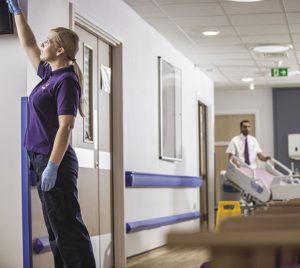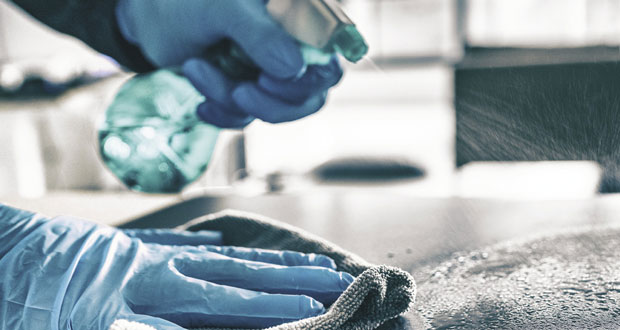RESOURCING ISSUES
Resourcing is going to be a huge challenge for the cleaning sector. The BCC anticipates that it will be harder to recruit personnel in the future, due both to Brexit and recent changes in immigration rules. Despite the fact that overseas staff are such an important part of the cleaning and hygiene sector’s workforce, immigration rules currently class cleaning operatives as ‘unskilled’ or being exempt of skill which makes it much harder for people from overseas to come into this country to work in the industry.
Says Melvin: “The view that staff are exempt of skill is completely unjustified and misguided – as indeed the COVID-19 pandemic has ably demonstrated. I do not recall anyone being concerned that so-called ‘unskilled’ hygiene operatives were helping to keep people safe. However, I do recall the Prime Minister amongst others praising our teams. As these tragic circumstances have shown cleaning and hygiene operatives are not only doing skilled and essential work but doing it extremely well. That should not and cannot be forgotten.”
The BCC has been concerned about the future in relation to the Immigration Act and its contents and is calling for a change in immigration rules as part of its strategic approach.
Cleanology CEO Dominic Ponniah points out that the pandemic may have gone some way to raising the status of cleaners as key workers, but he adds: “We have a long way to go to before cleaning operatives are valued as highly as they deserve. At management level, our industry struggles to attract the top candidates, who feel cleaning is not as bright and sparkly as other sectors like hospitality or retail.”
When it comes to recruitment adds Ponniah: “Our recent candidates have been drawn by our work on sustainability or fair pay, rather than a driving desire to work in cleaning.”
While sustainability may have appeared to take a back seat during the pandemic, it still plays an important role in the cleaning sector. At Mitie, in addition to using net zero emission electric vehicles to transport cleaning supplies across customers’ sites, all products it utilises are checked thoroughly, with in many cases solutions focused on reducing the amount of packaging of the products and limiting the landfill waste that cleaning services generate.
Says Davis: “We decided to replace the cleaning products with chemical-free alternatives and, if this wasn’t a feasible option, to start using predosed sachets – made of recyclable material, of course – to limit the amount of chemicals we use and the number of bulky products that need to be transported around the country.”
Mitie is also using technology to make cleaning services more sustainable. For example, with some of its NHS Trust customers, it’s rolled-out autonomous scrubber-drier robots. Meanwhile, at Mitie’s Head Office in The Shard and at some customers’ sites, including offices, train stations and airports, UV light disinfection systems have been installed to reduce the amount of virus and bacteria in the air and on surfaces without having to use any chemicals.
For the BCC, says Melvin: “Virtually everyone within the cleaning and hygiene industry is likely to be completing or working on their sustainability and environmental strategies and SDG’s (Sustainable Development Goals) which may include areas such as carbon offsetting and will almost certainly include financial accounting under ESG as a year-end requirement.
“In doing so they continue to ensure that cleanliness and hygiene are fully maintained whilst also working towards SDG’s. All of the approaches taken by the industry are also demonstrated at events such as The Cleaning Show and via the CSSA (Cleaning and Support Services Association) Innovation Showcase.”
SKILLS SET
Alongside the recruitment challenge is that of ensuring cleaning operatives are offered the best training possible. The BCC regards training programmes and the development of teams as the lifeblood of the industry.
Davis believes there is a science to cleaning services: “And this requires both skills and knowledge, from health and safety to infection control, and cleaning best practice to using new technology. We know that all these areas are important when it comes to training teams so we’ve developed courses and guidance to help our colleagues not only develop the skills they need to deliver excellent services for our customers, but also to progress their careers.”
On a broader scale adds Melvin: “The BCC is actively involved in The Apprenticeship Levy Trailblazer Group on behalf of the industry. Currently we have no accreditation despite the fact that we are a £56 billion industry employing 1.47 million staff. That simply cannot be justified as it results in a great many companies within the industry not being able to use the Apprenticeship Levy funds to deliver more apprentices, which is a stated part of Government policy. In effect, we are paying monies for a Government led accreditation that we currently do not have full access to, and as such can arguably be described as a stealth tax. We have recently had some promising discussions with The  Institute of Apprenticeships and Technical Education and remain extremely hopeful that this may change.
Institute of Apprenticeships and Technical Education and remain extremely hopeful that this may change.
“The Worshipful Company of Environmental Cleaners have been working diligently on the Chartered Practitioners Register for Environmental Cleaning. Between the register and any potential success in the Apprenticeship Levy, there is arguably a pathway for a cradle to grave industry development programme.
“These are just some obvious examples of the plethora of work that is currently being undertaken within the industry. If successful, it is hard to imagine that there would be any evidence to support a continued claim that our cleaning and hygiene teams could ever be seen to be exempt of skill.”





